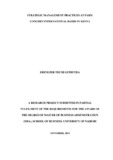| dc.description.abstract | Strategic management is concerned with the complexity arising out of ambiguity and
non-routine situations with organization-wide rather than operation-specific
implications. The complexity is that there is no one universal approach to strategic
management. Organizations carry out strategic management differently due to the fact
that management is context specific. NGOs operating within the developing countries,
Kenya included, have faced turbulent environmental changes. They have been forced
to constantly scan the environment for strategic positioning especially due to the rate
at which grants from developed countries are reducing. The study objective was to
establish the strategic management practices at Farm Concern International based in
Kenya. Literature review was carried out to establish the theories forming the
foundation of the study. Case study was the design used to get detailed information
regarding Farm Concern International’s strategic management practices. The data was
collected through interview guides administered on seven (7) senior managers
including two (3) senior managers from directorate offices and four (4) senior
managers heading various divisions at Farm Concern International regional office.
Content analysis as one that provides the researcher with a qualitative picture of
respondents’ concerns, ideas, attitudes and feelings was used to analyse data. The
study established that there were informal strategic management practices until 2013
when the organization embarked on formal strategic planning. Donors conflicting
demands came out as the most influencing factor on strategy formulation and
implementation. This was highlighted to be the main reason why no formal strategy
document had been formulated in the last one decade. At nascent stage, FCI could not
craft strategy accommodating the interests of all donors. The study recommended that
strategy development should ensure donors and other stakeholders’ buy-into the
strategic direction. This will be achieved by ensuring stakeholders’ involvement in the
strategy development process as much as possible. The strategy document must be
compelling and convincing to the eyes of major stakeholders so as to marshal
resources from other quarters other than being overly dependent on donor funding.
The study was carried out within time and resources constraints. The researcher
suggested two areas for further research. A repeat study on strategic management
practices at the Farm Concern international should be conducted after a few years of
putting the strategy into implementation. Researchers should further find out whether
other than the tenets of strategy, there are other factors that would contribute to
organizational exponential growth and whether those factors could be sustainable in
non-governmental organizations. | en_US |

